
The second project will streamline the methods for manufacturing these enzymes at scale. JBEI, ABF, and ABPDU are part of Berkeley Lab’s BioManufactory—a collaborative group of programmes that partner with industry to provide expertise and support as companies develop, optimise, and scale-up their bio-based projects, Protein Evolution said in a press release.
“Our innovative process uses AI to design novel enzymes to transform various types of polyester waste back into the building blocks of new polyester,” said Maren Wehrs, director of Bioprocess Development of Protein Evolution. “These partnerships provide access to cutting-edge research, infrastructure, and a wealth of domain expertise that will help us accelerate sustainable waste management and the global transition to a lower-carbon, circular economy.”
Protein Evolution’s innovative technology is the first in the US to use enzymes as a catalyst to successfully produce new polyethylene terephthalate (PET) from polyester textile waste. The PET resulting from Protein Evolution’s process is indistinguishable from the petroleum-derived virgin alternative, but with a far lower carbon footprint, and it is suitable for both textile and packaging grade applications. The company is actively scaling its commercial capacity to take in greater quantities and more diverse types of plastic waste as feedstock to facilitate the production of low-carbon polyester.
Protein Evolution’s partnerships with JBEI, ABF, and ABPDU share the overarching goal to reduce emissions from petroleum-based plastic production and the landfilling and incineration of plastic waste.
“Identifying and cost-effectively producing highly catalytic enzymes to transform waste into new products has the potential to significantly reduce industry’s reliance on petroleum,” said Jay Konieczka, chief technology officer at Protein Evolution. “At scale, our technology will divert millions of waste products from landfills and the environment, helping to reduce pollution, conserve natural resources, and contribute to a more sustainable and cleaner future.”
The ABF, which is supported by DOE’s Bioenergy Technologies Office (BETO), is a consortium of seven national laboratories dedicated to the sustainable biomanufacturing of affordable fuels and chemicals. As one of the ABF’s five newly selected projects aimed to decarbonise society, Protein Evolution will use AI to design new classes of enzymes to break down plastic. The Protein Evolution team will collaborate with two ABF consortium members, the National Renewable Energy Laboratory (NREL) and Oak Ridge National Laboratory (ORNL), leveraging their expertise and infrastructure in high-throughput enzyme expression, characterisation, and machine learning. The goal of the partnership is to accelerate the development of a polyester degrading enzyme system through generative AI and machine learning-enhanced search and optimisation.
Protein Evolution is partnering with ABPDU, ABF, and JBEI to accelerate the development and readiness of new, affordable enzymes for manufacturing, with the goal of smoothly transitioning from proof of concept to world-scale production.
In later stages of the project, ABPDU, which is also supported by BETO, will offer expertise in scalable fermentation and protein separation procedures.
Fibre2Fashion News Desk (NB)